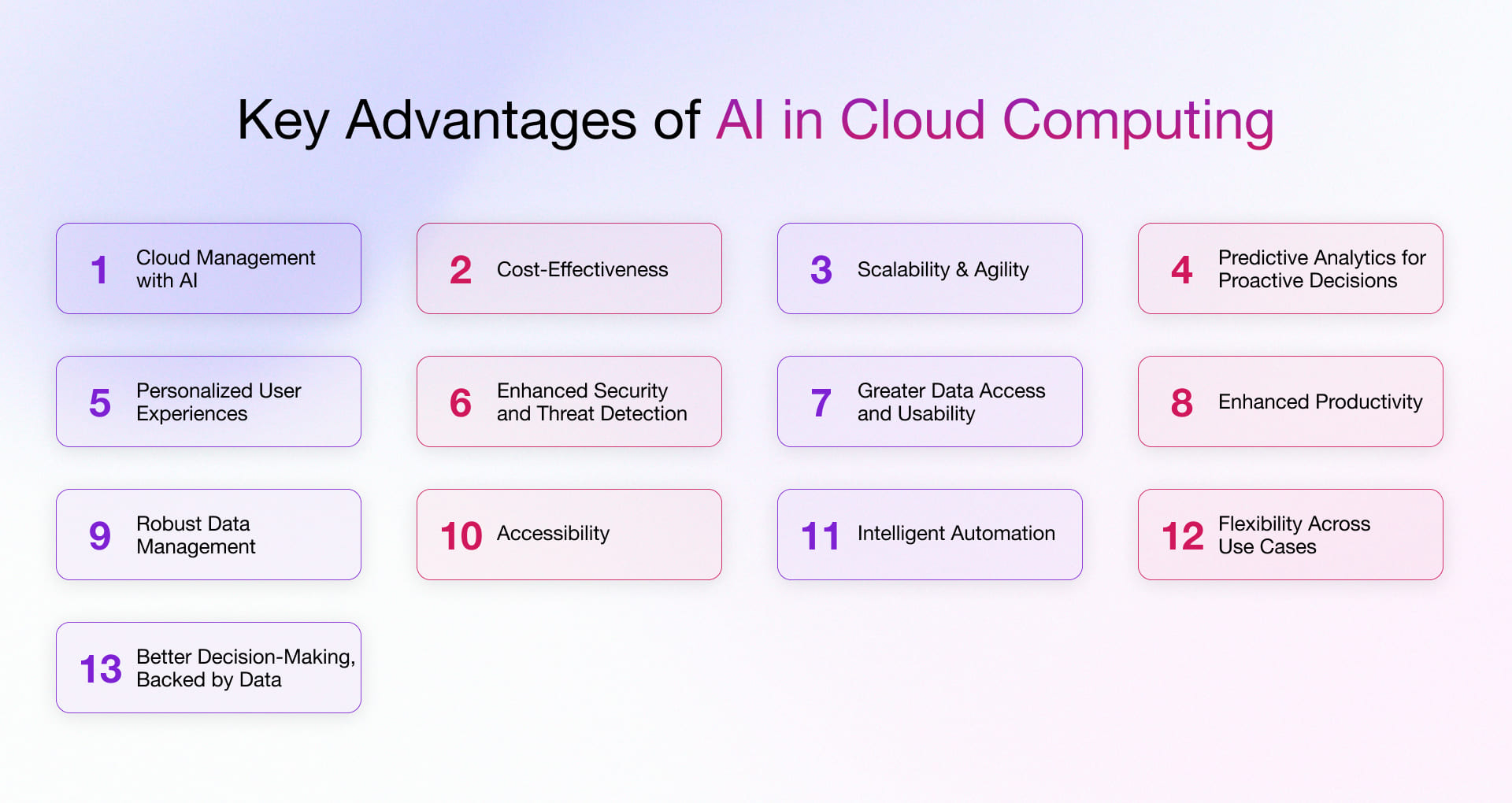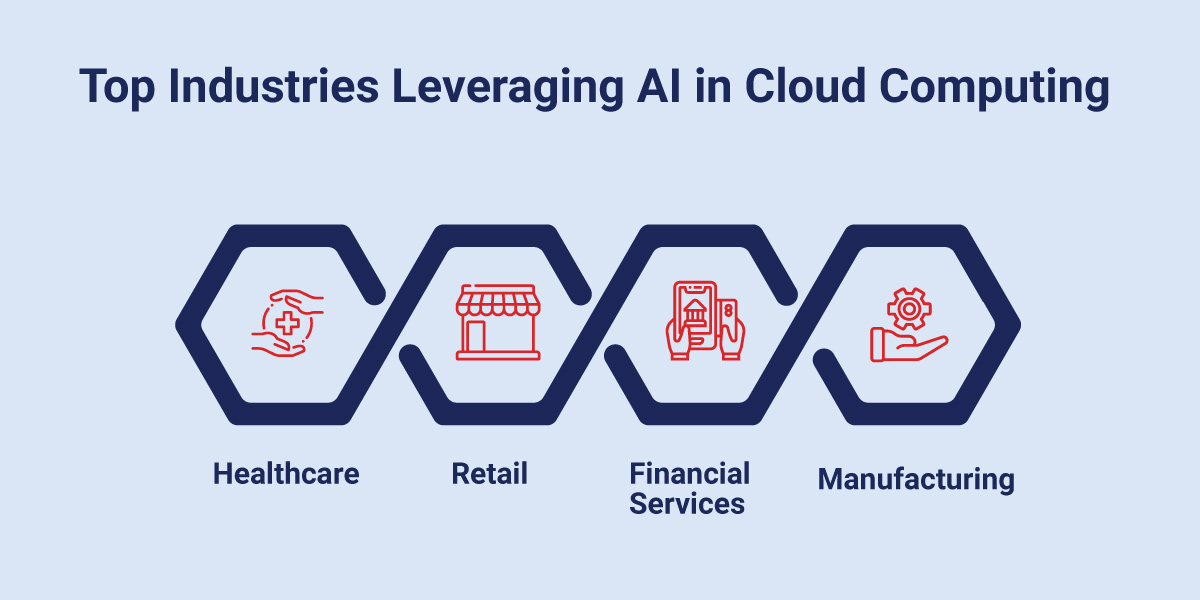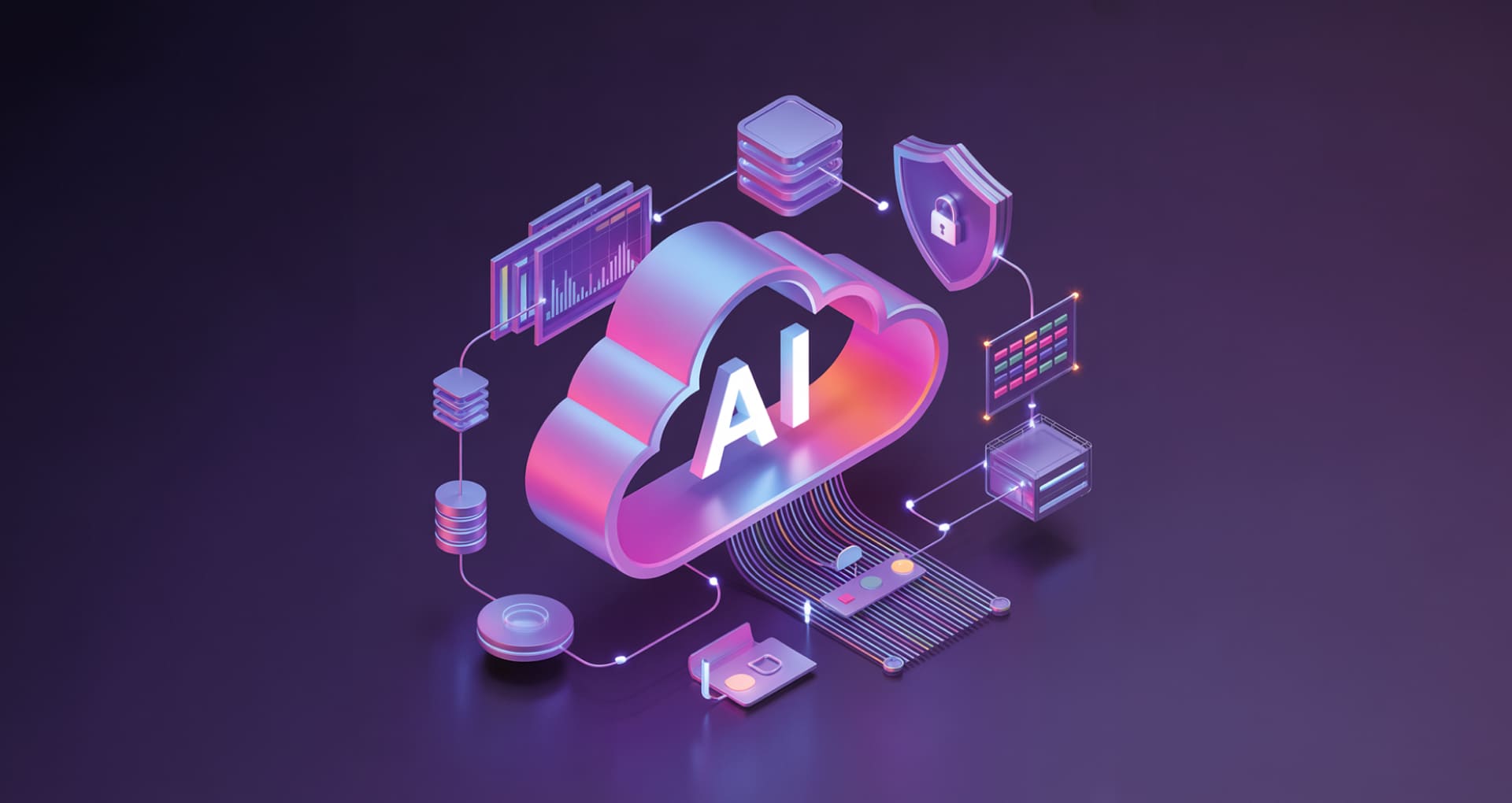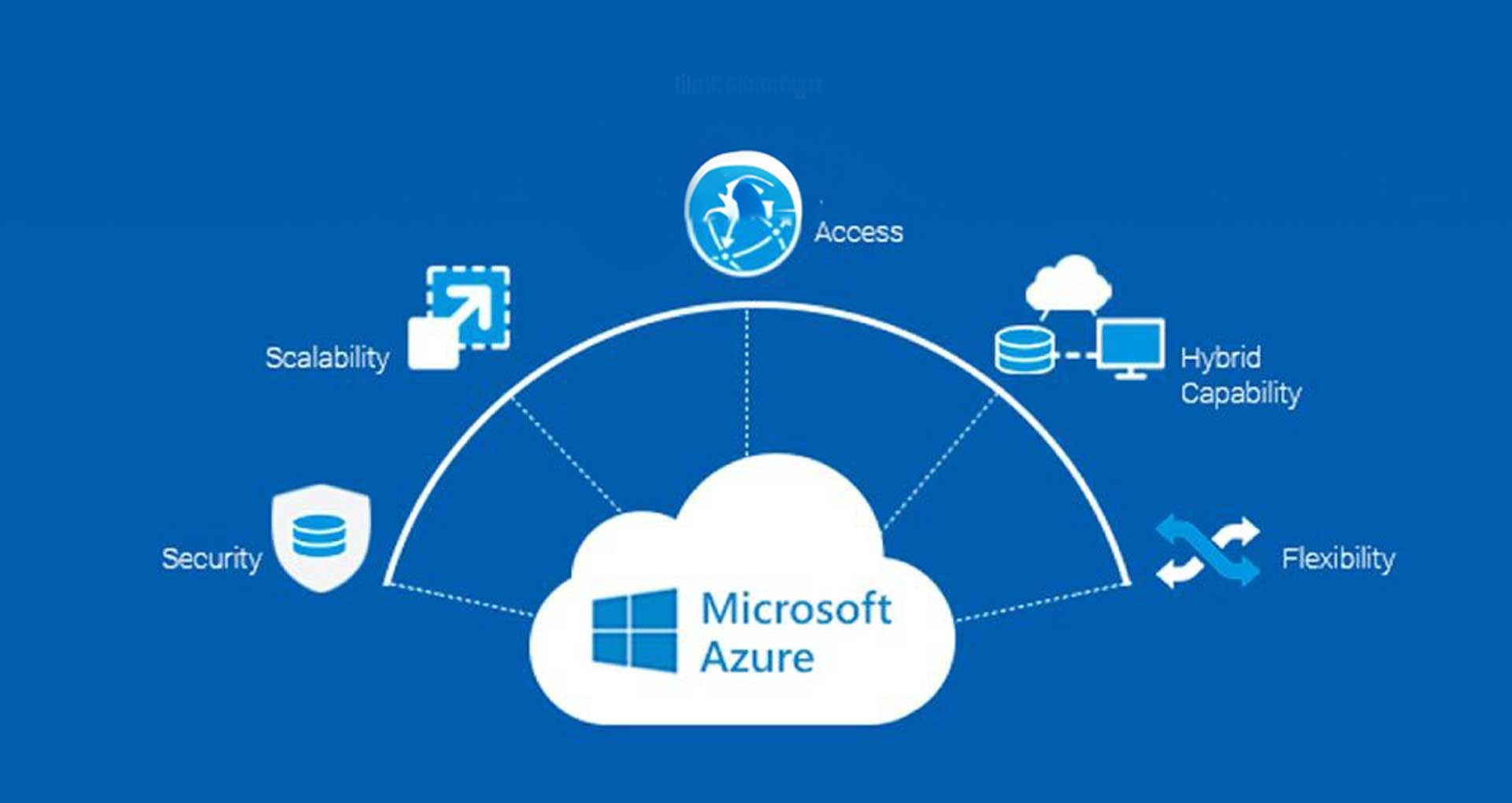The symbiotic relationship between Artificial Intelligence and cloud computing is propelling businesses forward in strategic, efficient, and insight-driven ways while driving digital transformation across the organizations. By 2026, cloud computing market is projected to double from its current valuation to $947 Billion, on the other hand AI market is expected to grow 5 times more in the same period with $309 Billion.
Let’s delve into detail to understand the game-changing synergy between cloud computing and AI, its impact on businesses, and how it is revolutionizing business operations while driving digital transformation across enterprises. We will also walk you through the benefits, usage across industries and challenges along with their solutions of AI in cloud computing to optimize your business operations for the digital age.
The Unification of Artificial Intelligence and Cloud Computing
The boundaries between Artificial Intelligence and cloud computing are forming a powerful synergy. Cloud computing provides the substantial resources and scalability needed for advancing AI applications. These applications, in turn, can optimize and automate various cloud functions, from resource allocation to security threat detection. This unification fuels innovation across industries, from personalized customer experiences to automating processes, predicting outcomes, and recommending real-time actions.
The best example to take into consideration is how virtual assistants like Alexa and Siri are using the cloud’s elastic resources to process voice requests rapidly. On the other hand, Machine Learning algorithms interpret speech, generate responses, and access cloud services – all delivered through a conversational interface.
Organizations are no longer required to choose between having in-house AI expertise or outsourcing models – cloud computing provides a convenient middle ground.
Importance of Artificial Intelligence in Cloud Computing
Enterprises that treat AI as optional in their cloud strategy are falling behind. The future belongs to those building intelligent, adaptive cloud ecosystems powered by AI from the ground up. Modern enterprises aren’t just adopting AI. They’re architecting their entire cloud stack around it. Why? Because AI isn’t just boosting performance; it’s fundamentally changing how cloud environments are managed, scaled, and optimized.
- Operational Efficiency at Scale: AI-powered automation helps you move from reactive to predictive operations. From autoscaling to anomaly detection, it cuts manual intervention and slashes downtime.
- Smarter Resource Allocation: AI engines dynamically tune compute, storage, and network resources based on usage patterns. This delivers serious cost savings in multi-cloud and hybrid setups.
- Security That Learns in Real Time: With AI in the loop, threat detection evolves continuously. It identifies patterns humans can’t, flags zero-day vulnerabilities, and adapts security protocols on the fly.
- Faster Innovation Cycles: Cloud-native capabilities, from generative AI APIs to MLOps platforms, shorten the time from ideation to deployment. Your teams can ship smarter products, faster.
For forward-looking tech leaders, the real question isn’t if you should integrate AI in your cloud strategy. It’s how fast you can scale it before your competitors do.
Top Benefits of AI in Cloud Computing

Integration of Artificial Intelligence in cloud computing has unlocked numerous business opportunities to be productive and stay competitive in the global span of the market. This powerful combination delivers businesses exceptional flexibility, agility, and cost-effectiveness. Let’s explore some of the significant benefits of AI in cloud computing.
1. Cloud Management with AI
AI simplifies complex cloud management tasks by automating infrastructure provisioning, monitoring, and optimization. Intelligent algorithms can detect usage anomalies, rebalance workloads, and even recommend performance tweaks. This improves uptime, reduces waste, and lowers TCO.
2. Cost-Effectiveness
The cloud’s pay-as-you-go pricing model enables businesses to avoid large upfront investments into on-premises infrastructure for adopting AI capabilities. Cloud provides affordable and flexible access to critical computing resources such as GPUs for training Machine Learning models, scalable storage for hosting large datasets, and fully managed AI services through on-demand provisioning. Also, integrating AI accelerates automation of time-consuming and repetitive tasks, saving on human effort and operational costs.
3. Scalability & Agility
The cloud’s on-demand resource availability and AI’s self-learning capabilities provide unmatched scalability and flexibility. Enterprises can quickly scale up or down their cloud resources to meet evolving AI workload requirements without upfront capital investment. This agility is critical for adjusting to changing business needs. AI applications on the cloud can also be updated seamlessly without affecting core operations.
4. Predictive Analytics for Proactive Decisions
AI enables predictive analytics that surface patterns, trends, and anomalies well before human analysts spot them. Running on cloud infrastructure, these models can analyze massive datasets in real time to forecast outcomes, optimize supply chains, or flag potential system failures before they escalate.
5. Personalized User Experiences
Whether it’s internal tools or customer-facing platforms, AI in the cloud enables hyper-personalization at scale. From tailored recommendations to adaptive interfaces, enterprises can deliver dynamic experiences based on user behavior, preferences, and engagement patterns, without adding complexity on the backend.
6. Enhanced Security and Threat Detection
AI bolsters cloud security by identifying threats in real time. Unlike static rule-based systems, AI models learn from new attack vectors and adapt continuously. This dynamic protection layer identifies anomalies, flags zero-day exploits, and supports faster incident response with context-rich alerts.
7. Greater Data Access and Usability
Cloud AI democratizes access to data insights across the organization. With intuitive dashboards, visual discovery tools, and conversational AI, even non-technical users can derive value from complex datasets. This accessibility breaks silos and empowers more informed, faster decisions.
8. Enhanced Productivity
By automating time-consuming, repetitive tasks, AI applications augment human capabilities and focus teams on more strategic, value-adding work. For instance, chatbots handle customer queries, AI analyzes data to derive insights, and software robots automate workflows. This leads to higher output and faster growth.
9. Robust Data Management
The virtually unlimited storage capacity along with compute power of the cloud, combined with evolving AI capabilities, provides a robust framework for harnessing data effectively. Using techniques like natural language processing, AI can structure and extract meaningful signals from unstructured data like text, voice, videos.
These signals and insights can then fuel accurate forecasts and recommendations. AI identifies hidden correlations and patterns to surface actionable insights not apparent to humans. The cloud also enables building collaborative data lakes, creating a single source of truth.
10. Accessibility
The ability to access scalable computing resources, storage, pre-built AI applications and development environments on demand enables easy implementation of AI across the organization. Employees can securely access data and tools needed to build and run AI applications from anywhere, without needing specialized on-premises infrastructure.
Cloud computing with AI also provides intuitive interfaces and automation capabilities to simplify data access through conversational search and visual data discovery tools. This expands access to AI’s benefits for both technical and non-technical users.
11. Intelligent Automation
AI introduces automation of repetitive and routine tasks, processes, and end-to-end workflows in the cloud. This saves human time and effort allowing staff instead to channel energy into higher-value creative and strategic work. AI programs running on the cloud can self-correct, adapt and continue to optimize operations automatically without human intervention.
AI models also keep improving themselves through continuous learning from data patterns. The scalability of cloud allows expanding automation to new use cases by developing new deep learning models quickly.
12. Flexibility Across Use Cases
From AI-driven customer engagement to backend automation, the flexibility of cloud platforms supports every AI use case imaginable. Organizations can build, test, and scale multiple AI models in parallel without overhauling their existing tech stack or investing in niche infrastructure.
13. Better Decision-Making, Backed by Data
At the intersection of AI and cloud lies data-driven decision-making. AI continuously processes, interprets, and refines insights from massive, diverse datasets. This allows business leaders to move from gut-feel decisions to data-backed strategies that are faster, smarter, and more impactful.
Top Industries Leveraging Artificial Intelligence in Cloud Computing
Here is an industry-wise breakdown on how AI applications in the cloud are transforming across different sectors.

Healthcare
- Cloud-based AI is revolutionizing medical imaging to detect diseases faster and more accurately. Systems can analyze scans and spot anomalies difficult for humans to catch.
- Virtual health assistants powered by cloud AI are making diagnosis and treatment recommendations based on patient data and medical history. This expands access to healthcare.
- AI and big data analytics on the cloud are enabling precision medicine and personalized treatment plans for patients.
Retail
- Intelligent chatbots are changing how retailers interact with and engage customers online. Cloud-based AI chatbots offer 24/7 support.
- Recommendation engines utilize cloud AI to analyze preferences and recommend products. This results in higher sales conversions.
- Computer vision AI enables retail automation from inventory tracking to self-checkout. Surveillance systems can also detect theft and unusual activity.
Financial Services
- Banks use NLP and sentiment analysis to improve customer experience and detect fraud in real-time. Trade platforms also use AI to analyze news and data to generate trading signals.
- Robo-advisors powered by the cloud apply AI to provide customized investment recommendations and manage portfolios automatically.
- Cloud analytics helps fintech companies generate credit risk models for lending and insurance decisions. AI evaluates alternative data points to broaden access.
Manufacturing
- AI optimizes production quality control and predicts equipment maintenance needs before breakdowns. This boosts efficiency and output.
- Computer vision AI automates tasks from product inspection to analyzing assembly line operations. This reduces defects and improves safety.
- Supply chain analytics with ML algorithms help forecast demand, optimize logistics and inventory costs. This provides a competitive edge.
Applications of AI in Cloud Computing
AI is no longer just a layer on top of the cloud. It is embedded across its core services, accelerating how businesses innovate, scale, and compete. Here’s how enterprises are practically applying AI in cloud environments to drive measurable impact:
1. Smart Resource Optimization
AI algorithms continuously monitor usage patterns and predict demand. This enables real-time auto-scaling of resources like compute and storage, reducing overprovisioning and cloud waste while ensuring performance under peak loads.
2. Automated Cloud Security
AI strengthens security postures by detecting threats, identifying anomalies, and automating responses. Machine learning models analyze massive security logs to flag abnormal behaviors faster than traditional methods. This minimizes risks from advanced cyber threats.
3. AI-Powered DevOps (AIOps)
From predictive maintenance to intelligent incident management, AI enables proactive DevOps. It correlates logs, metrics, and events to auto-resolve issues, optimize CI/CD pipelines, and deliver faster release cycles with reduced downtime.
4. Intelligent Data Processing
Cloud-native AI tools process unstructured data such as images, audio, or text at scale. This drives applications in customer analytics, document processing, and sentiment analysis without needing on-premises AI infrastructure.
5. Personalized Customer Experiences
Enterprises are using AI in the cloud to create hyper-personalized user experiences across digital platforms. Recommendation engines, dynamic content, and adaptive interfaces are powered by real-time behavioral insights from AI models running on cloud backends.
6. Enhanced Virtual Assistants and Chatbots
AI in cloud-based virtual assistants allows businesses to automate customer support, onboarding, and even internal service desks. These systems get smarter with each interaction and improve both response time and relevance.
7. Predictive Analytics for Strategic Planning
Enterprises use cloud-based AI to analyze historical and real-time data, identifying trends that guide decision-making in areas like inventory forecasting, risk assessment, and financial modeling.
8. AI-Driven Compliance Monitoring
AI tools hosted on the cloud can continuously scan for regulatory non-compliance across operations. This helps industries such as finance and healthcare automate audit trails and meet stringent compliance requirements with minimal manual effort.
Common Challenges of AI in Cloud Computing and How to Overcome Them
The role of AI in cloud computing shows immense potential but also poses new challenges for enterprises. With the right cloud strategies, platforms, and partners, companies can overcome these hurdles and deliver business value with this ideal combination of both the innovative technologies.
Lack of AI Expertise
Many organizations need help with an internal AI and machine learning skills gap. Building in-house teams with AI capabilities requires significant time and investment.
Solution: Partner with cloud service providers and AI consulting services company that offer deep AI expertise-as-a-service. They can help define AI strategy, build and deploy models, and provide ongoing model ops.
Data Complexities
Building accurate AI models requires vast amounts of high-quality, clean data. Collecting, cleaning, and labeling training data remains a challenge.
Solution: Leverage data services on the cloud that can aggregate data from diverse sources and preprocess it for model development. AutoML solutions can also help reduce manual data wrangling.
Model Governance
As organizations scale AI models, they need robust model governance, including version control, model monitoring, bias detection, and explainability.
Solution: Implement MLOps for the full model lifecycle on the cloud. This includes using model registries, metadata management, CI/CD pipelines, and model monitoring tools.
Security Risks
Storing data on the cloud and deploying AI models creates potential security vulnerabilities like data breaches, model theft, or poisoning attacks.
Solution: Build stringent security practices including data encryption, identity management, code verification, and continuous security monitoring around AI workloads.
Technology Lock-In
Depending on a single cloud provider for your AI needs can result in vendor lock-in. This limits flexibility in adopting innovations.
Solution: Design portable AI architectures using containers and standardized frameworks so models can be deployed across different cloud environments.
Future of AI in Cloud Computing
AI in the cloud is just getting started. What began as task automation and basic analytics is rapidly evolving into enterprise-wide intelligence engines. As infrastructure matures and AI models grow more sophisticated, the cloud will not just host AI. It will enable next-gen business transformation. Here’s what’s coming:
1. AI-Native Cloud Architectures
Future cloud platforms will be built with AI as a core component, not an add-on. Expect AI-native orchestration, self-healing infrastructure, and autonomous optimization layers that eliminate the need for manual tuning or intervention.
2. Democratization of AI Capabilities
Low-code and no-code AI tools powered by cloud platforms will empower business users, not just data scientists. This will accelerate AI adoption across departments like HR, marketing, and finance, making intelligent decision-making a default, not a luxury.
3. Fusion of AI, Edge, and IoT
Cloud providers will increasingly support AI inference at the edge. From smart factories to autonomous vehicles, the combination of AI, edge computing, and cloud will enable real-time decision-making where latency is critical, and connectivity is unreliable.
4. Industry-Specific AI Cloud Services
AI capabilities are becoming more specialized, with sectors like healthcare and finance leveraging tools built for their unique needs to drive quicker, more impactful results.
5. Greater Focus on AI Governance and Ethics
As AI becomes embedded in critical operations, enterprises will prioritize responsible AI. Cloud providers will offer built-in compliance tools, bias detection modules, and transparency features to help businesses meet regulatory and ethical standards at scale.
6. Quantum-Ready AI Workloads
While still emerging, the intersection of AI and quantum computing will eventually be cloud-powered. Enterprises will look to cloud platforms for running quantum-enhanced machine learning algorithms that solve problems today’s systems cannot.
Why Choose Rishabh Software to Future-Proof Your Cloud Strategy with AI?
At Rishabh Software, we offer a comprehensive suite of cloud computing & artificial intelligence development services to empower your business operations with the combined capabilities of AI. We will help you leverage the full potential of cloud to experience the transformative synergy of AI and cloud computing to unlock new growth opportunities.
As a certified service partners for AWS and Microsoft Azure, we also offer a full range of capabilities around cloud-native applications. Our end-to-end cloud expertise covers custom cloud application development, modernization, migration, consultation and managed services.
Frequently Asked Questions
Q: What is AI in Cloud Computing?
A: The role of AI in cloud computing is like a smart assistant for cloud computing. It helps automate tasks, analyze data faster, and make better decisions for the cloud. This leads to benefits like:
1) Increased efficiency – By automating manual processes, AI saves time and computing resources in the cloud. For example, AI chatbots handle routine customer queries, freeing up human agents.
2) Improved decision-making – AI can rapidly analyze large datasets in the cloud to uncover insights and patterns. These data-driven insights allow the cloud to make better informed choices and predictions.
3) Enhanced security – AI algorithms can quickly detect anomalies and threats. This allows cloud providers to identify and respond to attacks early.
Overall, AI in cloud computing makes things faster, smarter, and more secure.
Q: How is artificial intelligence transforming cloud computing?
A: AI is reshaping cloud computing from a static infrastructure to an intelligent, adaptive ecosystem. It enables automated resource management, self-healing systems, predictive analytics, and enhanced security, making cloud environments smarter, faster, and more cost-efficient.
With AI in the mix, enterprises can process vast volumes of data in real time, personalize customer experiences at scale, detect threats before they escalate, and streamline operations without manual intervention. This transformation is not just about tech efficiency. It is about driving better decisions, faster innovation, and stronger business outcomes across every layer of the cloud stack.








